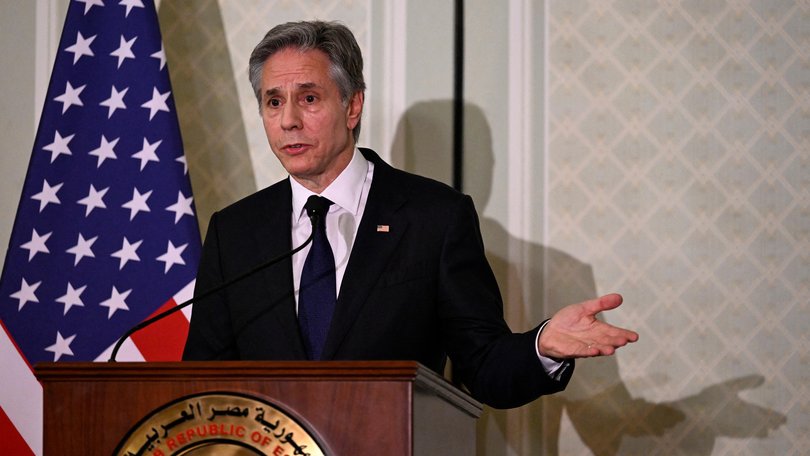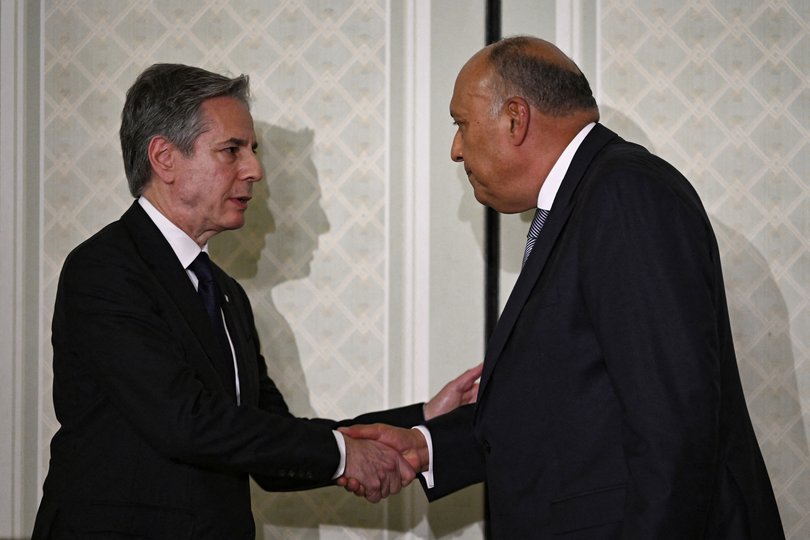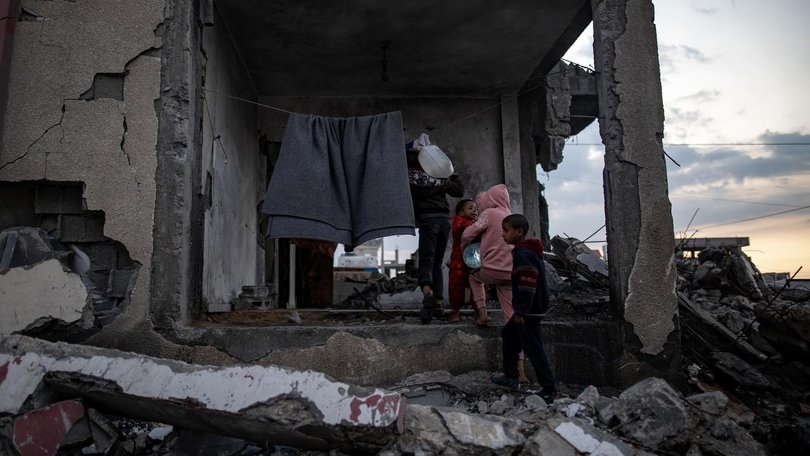US to bring UN resolution calling for Gaza ceasefire as Blinken issues Rafah warning
Revelations of the draft resolution calling for a ceasefire came as US Secretary of State Anthony Blinken warned Israel against a major ground assault on the southern Gaza town of Rafah.

The United States will bring a draft resolution calling for an immediate ceasefire in Gaza and an Israel-Hamas hostage deal to a UN Security Council vote.
the latest version of the draft resolution was revealed as relations continued to sour between the two countries with US Secretary of State Antony Blinken warning that a major Israeli ground assault on the southern Gaza town of Rafah would be “a mistake” and “unnecessary” to defeating Hamas.
The draft resolution, seen by Reuters, says an “immediate and sustained ceasefire” lasting roughly six weeks would protect civilians and allow for the delivery of humanitarian assistance.
Sign up to The Nightly's newsletters.
Get the first look at the digital newspaper, curated daily stories and breaking headlines delivered to your inbox.
By continuing you agree to our Terms and Privacy Policy.The resolution “unequivocally supports ongoing international diplomatic efforts to secure such a ceasefire in connection with the release of all remaining hostages,” it reads, referring to ongoing talks brokered by the United States, Egypt and Qatar.
Nate Evans, spokesperson for the US mission to the United Nations, said on Thursday that the 15-member council would vote on Friday morning on the text negotiated in “many rounds of consultations” with Security Council members.

To pass, a resolution needs at least nine votes and no vetoes by the US, France, Britain, Russia or China.
The US has wanted any Security Council support for a ceasefire to be linked to the release of hostages held by Hamas in Gaza. Hamas attacked Israel on October 7, killing 1,200 people and taking 253 hostages, according to Israeli tallies.
During the five-month-long war, Washington has vetoed three draft resolutions, two which would have demanded an immediate ceasefire. Most recently, the US justified its veto by saying such council action could jeopardise efforts by the US, Egypt and Qatar to broker a pause in the war and release of hostages.
The US traditionally shields Israel at the United Nations, but it has also abstained twice, allowing the council to adopt resolutions that aimed to boost aid to Gaza and called for extended pauses in fighting.
Mr Blinken, on his sixth urgent Mideast mission since the war began, also called for an “immediate sustained ceasefire” with the release of Israeli hostages held by Hamas with further warnings that gaps were narrowing in indirect negotiations that US, Egypt and Qatar have been working on.
Mr Blinken, who spoke out against a Rafah ground assault after huddling with top Arab diplomats in Cairo on Thursday, heads to Israel on Friday to meet Prime Minister Benjamin Netanyahu and his war cabinet.
The growing disagreements between Mr Netanyahu and President Joe Biden over the prosecution of the war will likely overshadow those talks -- particularly over Mr Netanyahu’s determination to launch a ground assault on Rafah, where more than a million Palestinians have sought refuge from devastating Israeli ground and air strikes further north.
Mr Netanyahu has said that without an invasion of Rafah, Israel can’t achieve its goal of destroying Hamas after its deadly October 7 attack which triggered Israel’s bombardment and offensive in Gaza.
“A major military operation in Rafah would be a mistake, something we don’t support. And, it’s also not necessary to deal with Hamas, which is necessary,” Mr Blinken told a news conference in Cairo with Egyptian Foreign Minister Sameh Shoukry.
A major offensive would mean more civilian deaths and worsen Gaza’s humanitarian crisis, Mr Blinken said, adding that his talks on Rafah in Israel on Friday and discussions between senior US and Israeli officials next week in Washington will be to share ideas for alternative action.

The US position on a Rafah operation has shifted significantly in recent days. Initially, US officials said they could not support a major incursion into the city unless there was a clear and credible plan for getting civilians out of harm’s way. Now, US officials said they have concluded that there is no credible way to do that given the density of the population of more than a million people. They say now that other options, including specifically targeted operations against known Hamas fighters and commanders, are the only way to avoid a civilian catastrophe.
But Mr Netanyahu, on a roughly 45-minute call with GOP senators on Wednesday, pledged to ignore warnings about a Rafah operation. He also took aim at Senate Majority Leader Chuck Schumer’s condemnation last week of the civilian death toll in Gaza and his call for new elections in Israel.
Republican senator John Kennedy, said Mr Netanyahu “made it very clear that he and the people of Israel intend to prosecute the war to the full extent of their power and that he would not be dictated to by Senator Schumer or President Biden.”
Mr Netanyahu has been accused by Israeli critics of undermining bipartisan American support by cultivating close ties with Republican leaders.
As Mr Blinken and the Arab ministers met, Gaza’s Health Ministry raised the territory’s death toll to nearly 32,000 Palestinians since the war began on its soil. Also, UN officials stepped up warnings that famine is “imminent” in northern Gaza.
Meanwhile, the United States said it would seek a swift vote on a newly revised and tougher UN resolution demanding “an immediate and sustained ceasefire” to protect civilians and enable humanitarian aid to be delivered. The US deputy ambassador to the UN, Robert Wood, said he hoped a vote could take place by the end of the week. The resolution is notable because it does not directly tie the release of the hostages to the need for a ceasefire.
However, Mr Blinken said the two must go hand-in-hand. “There is an urgent need for an immediate, sustained ceasefire with the release of hostages,” he said.
MR Netanyahu has also rejected the Biden administration’s repeated remonstrations that Israel’s long-term security cannot be assured without the creation of an independent Palestinian state.
The war began after Palestinian militants killed some 1,200 people in the October 7 attack that triggered the war, and abducted another 250 people. Hamas is still believed to be holding some 100 people hostage, as well as the remains of 30 others.
